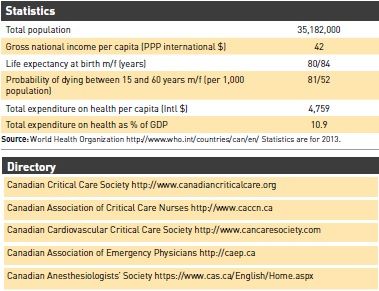ICU Management & Practice, ICU Volume 15 - Issue 3 - 2015
Interview With Professor Claudio Martin, President, Canadian Critical Care Society
Claudio M. Martin is President of the Canadian Critical Care Society. Dr. Martin is Professor in the Department of Medicine, Chair/Chief of Critical Care Western (Schulich School of Medicine and Dentistry, Western University) and Medical Director of Critical Care at London Health Sciences Centre in London, Ontario.
What is the role of the Critical Care Society of Canada and how important is it to have a voice for critical care?
The Canadian Critical Care Society (CCCS) is the national specialty society, representing adult and paediatric critical care medicine (CCM) physicians in Canada. Our mission is to promote and enhance critical care medicine in Canada. We espouse the philosophy of collaborative multidisciplinary practice to promote research, education and patient care in critical care medicine. To that end, our society is involved in CCM education in association with the Royal College of Physicians and Surgeons of Canada, and in CCM research with the Canadian Critical Care Trials Group.
What are the main challenges for critical care in Canada?
One challenge is the increasing demand for critical care (life support interventions) associated with a growing elderly and frail population. Meeting that demand together with appropriate end-of-life planning and decision making requires an investment in resources and public engagement. The CCCS produced a position paper in the 1990s on the subject of withholding and withdrawing life support. This position paper is being updated taking into account more recent legal decisions in Canada. We don’t support that age by itself should be a determining factor for admission to critical care units. Canada is a large and geographically diverse country. It is hard to imagine that patients in remote communities have access or receive the same level of critical care when faced with progressive and life-threatening illness compared to those in the urban centres. Some tele-ICU has been introduced in remote communities, but further work on the model and process is required. The business model that has largely supported the growth in the US does not apply in the Canadian system, and therefore tele-ICUs have not gained a major foothold in Canada.

A recent study on critical care capacity in Canada found substantial provincial variability (Fowler et al. 2015), and recommended further sharing and deployment of resources. What steps are being taken on this?
Healthcare is organised at the provincial level in Canada, although there are basic requirements and funding set out by the federal government. Some provinces, such as Ontario, British Columbia and Alberta have established system-level processes to help deal with unpredictable events to some extent. Mostly, these have been developed, tested and implemented to deal with individual patients or small numbers. Even knowing what resources are available and where they exist was progress, but it needs to be kept up-to-date. The CCCS is working to create and maintain a contact list of critical care units nationally to support this. We are planning to do a physician manpower survey across Canada that will include some fundamental data such as bed numbers and ventilation capacity. There are also projects underway to develop provincial and national quality indicators that will allow us to better understand the availability and use of critical care beds.
What can other countries learn from critical care in Canada?
Canada has a rich history in critical care, with specialisation and advanced training for physicians, nurses, respiratory therapists and other healthcare professionals. We had visionary leaders both in education and research who promoted the field of critical care. Our Canadian culture of collaboration and compromise resulted in some early success that fostered the growth and training of young educators and researchers.






